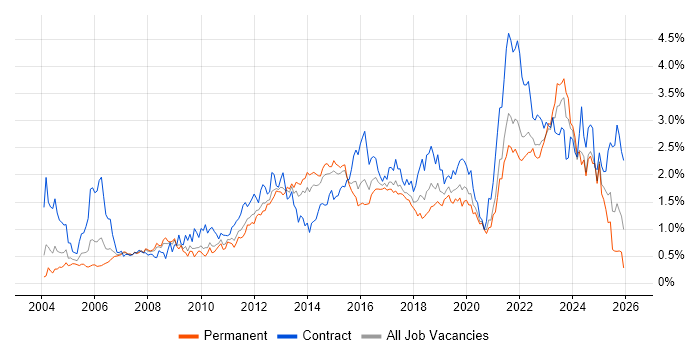Solution Architect
England > Yorkshire
The median Solution Architect salary in Yorkshire is £82,500 per year, according to job vacancies posted during the 6 months leading to 8 May 2025.
The table below provides salary benchmarking and summary statistics, comparing them to the same period in the previous two years.
| 6 months to 8 May 2025 |
Same period 2024 | Same period 2023 | |
|---|---|---|---|
| Rank | 106 | 71 | 137 |
| Rank change year-on-year | -35 | +66 | +5 |
| Permanent jobs requiring a Solutions Architect | 49 | 178 | 203 |
| As % of all permanent jobs advertised in Yorkshire | 1.79% | 3.07% | 2.47% |
| As % of the Job Titles category | 1.91% | 3.22% | 2.71% |
| Number of salaries quoted | 39 | 136 | 105 |
| 10th Percentile | £59,168 | £57,780 | £63,631 |
| 25th Percentile | £67,548 | £70,000 | £70,500 |
| Median annual salary (50th Percentile) | £82,500 | £77,500 | £77,500 |
| Median % change year-on-year | +6.45% | - | - |
| 75th Percentile | £98,474 | £86,250 | £81,250 |
| 90th Percentile | - | £96,539 | £85,000 |
| England median annual salary | £75,000 | £80,000 | £85,000 |
| % change year-on-year | -6.25% | -5.88% | - |
All Permanent IT Job Vacancies
Yorkshire
For comparison with the information above, the following table provides summary statistics for all permanent IT job vacancies in Yorkshire. Most job vacancies include a discernible job title that can be normalized. As such, the figures in the second row provide an indication of the number of permanent jobs in our overall sample.
| Permanent vacancies in Yorkshire with a recognized job title | 2,570 | 5,520 | 7,496 |
| % of permanent jobs with a recognized job title | 93.69% | 95.29% | 91.16% |
| Number of salaries quoted | 1,349 | 4,262 | 3,542 |
| 10th Percentile | £26,250 | £27,000 | £31,250 |
| 25th Percentile | £32,250 | £35,000 | £39,281 |
| Median annual salary (50th Percentile) | £49,000 | £49,500 | £54,882 |
| Median % change year-on-year | -1.01% | -9.81% | +9.76% |
| 75th Percentile | £69,750 | £65,000 | £70,000 |
| 90th Percentile | £87,500 | £80,000 | £82,500 |
| England median annual salary | £57,500 | £53,500 | £60,800 |
| % change year-on-year | +7.48% | -12.01% | +1.33% |
Solutions Architect
Job Vacancy Trend in Yorkshire
Job postings that featured Solutions Architect in the job title as a proportion of all IT jobs advertised in Yorkshire.

Solutions Architect
Salary Trend in Yorkshire
3-month moving average salary quoted in jobs citing Solutions Architect in Yorkshire.
Solutions Architect
Salary Histogram in Yorkshire
Salary distribution for jobs citing Solutions Architect in Yorkshire over the 6 months to 8 May 2025.
Solutions Architect
Job Locations in Yorkshire
The table below looks at the demand and provides a guide to the median salaries quoted in IT jobs citing Solutions Architect within the Yorkshire region over the 6 months to 8 May 2025. The 'Rank Change' column provides an indication of the change in demand within each location based on the same 6 month period last year.
| Location | Rank Change on Same Period Last Year |
Matching Permanent IT Job Ads |
Median Salary Past 6 Months |
Median Salary % Change on Same Period Last Year |
Live Jobs |
|---|---|---|---|---|---|
| West Yorkshire | -12 | 40 | £83,750 | +8.06% | 14 |
| South Yorkshire | +20 | 3 | £62,779 | -23.90% | 1 |
| Solutions Architect England |
|||||
Solutions Architect Skill Set
Top 30 Co-occurring Skills and Capabilities in Yorkshire
For the 6 months to 8 May 2025, Solutions Architect job roles required the following skills and capabilities in order of popularity. The figures indicate the absolute number co-occurrences and as a proportion of all permanent job ads across the Yorkshire region featuring Solutions Architect in the job title.
|
|
Solutions Architect Skill Set
Co-occurring Skills and Capabilities in Yorkshire by Category
The follow tables expand on the table above by listing co-occurrences grouped by category. The same employment type, locality and period is covered with up to 20 co-occurrences shown in each of the following categories:
|
|
|||||||||||||||||||||||||||||||||||||||||||||||||||||||||||||||||||||||||||
|
|
|||||||||||||||||||||||||||||||||||||||||||||||||||||||||||||||||||||||||||
|
|
|||||||||||||||||||||||||||||||||||||||||||||||||||||||||||||||||||||||||||
|
|
|||||||||||||||||||||||||||||||||||||||||||||||||||||||||||||||||||||||||||
|
|
|||||||||||||||||||||||||||||||||||||||||||||||||||||||||||||||||||||||||||
|
|
|||||||||||||||||||||||||||||||||||||||||||||||||||||||||||||||||||||||||||
|
|
|||||||||||||||||||||||||||||||||||||||||||||||||||||||||||||||||||||||||||
|
|
|||||||||||||||||||||||||||||||||||||||||||||||||||||||||||||||||||||||||||
|
||||||||||||||||||||||||||||||||||||||||||||||||||||||||||||||||||||||||||||
